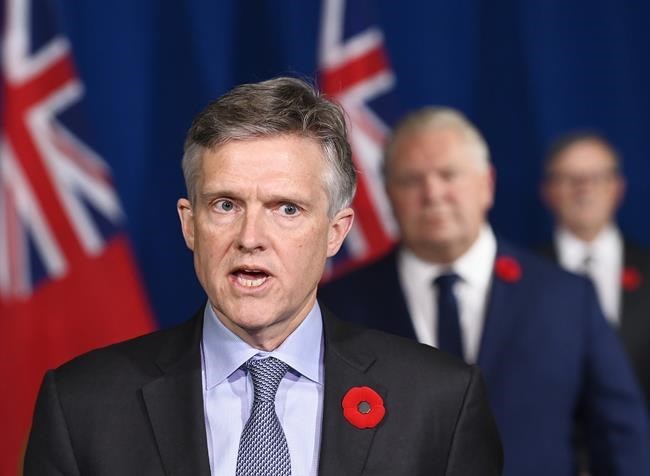TORONTO — Ontario will spend a record $187 billion this year as it lays out a plan to recover from the COVID-19 pandemic, with money earmarked for the health-care sector, to support for seniors living at home and to subsidize electricity rates for businesses.
The province's first budget since the start of the global health crisis shows it will spend $45 billion over the next three years to respond to the pandemic -- $30 billion was previously announced this year, and $15 billion in new funding will be spent over the next two years.
The fiscal plan presented Thursday also shows a record deficit of $38.5 billion for this year, consistent with the government's summer projections. A path to balance is expected in next year's budget.
In tabling the spending plan in the legislature, Finance Minister Rod Phillips said the budget aims to "provide as much certainty as possible in an uncertain time."
"There is still great uncertainty in the global economy, and this means the same thing for the Ontario budget as it does for the family and business budgets," Phillips said.
"This means there is a greater degree of risk underlying our projections than normal."
The Progressive Conservative government said it is spending $2.5 billion more on hospitals this fiscal year, including $572 million announced Thursday aimed specifically at offsetting COVID-19 expenses.
The budget also includes a tax credit meant to help seniors stay at home longer, which will reimburse them for 25 per cent on eligible renovations of up to $10,000, regardless of their income and whether they owe taxes for 2021.
It also renews funding to help parents with the added costs of at-home education, which consists of $200 per child under 12 and $250 per child or youth with special needs. That program will cost the province $380 million, on top of the $378 million spent earlier this year.
The document does not, however, provide costing for the new standard for long-term care announced earlier this week, which would see nursing home residents receive an average of four hours of direct care every day.
Asked about the omission, Premier Doug Ford insisted the province is "totally committed" to the new standard but said it needs to consult with stakeholders before providing more details.
Education spending is expected to stay largely the same over the next three years, with $31 billion allocated this fiscal year, $31.1 billion next year and $31.3 billion in 2022-2023.
The government is taking on a long-term expense in this budget by announcing it will subsidize a portion of hydro rates for medium and large commercial and industrial businesses, a move it said will help make the province more competitive.
Starting Jan. 1, 2021, the change will see industrial businesses save 14 per cent and commercial businesses save 16 per cent on their average bill. The province estimates the program will cost $1.3 billion next year, with costs gradually declining until 2040.
The province is also spending an additional $680 million over the next four years to expand rural broadband access. The program is expected to help 220,000 homes and businesses.
The Ontario Chamber of Commerce welcomed the province's move to address some of the costs businesses face regardless of whether they are bringing in revenue.
"Outlays such as property taxes and electricity rates have imposed considerable stress on business, especially small business, throughout the pandemic," Rocco Rossi, the organization's president and CEO, said in a statement.
Opposition legislators, however, decried what they called a lack of long-term support for hospitals, long-term care and businesses struggling to weather the pandemic, saying the fiscal plan contains only minor, one-off relief.
NDP Leader Andrea Horwath said the budget actually contains nearly $100 million less in planned spending for long-term care than what was laid out in a financial update the province released in March, and noted there is no money to ensure smaller classes in schools.
"Doug Ford is telling seniors in dangerously understaffed long-term care homes that more staff won’t come in this year – they’re on their own. He’s leaving more than 30 kids packed into classrooms," she said in a statement.
“He’s throwing in the towel on the fight against COVID-19, and telling people, families and businesses that no help is coming.”
Liberal Leader Steven Del Duca called the budget a "betrayal."
"Doug Ford's government is risking the lives of our seniors, our kids, their parents, and all people of colour. These are the people here in Ontario who needed action and leadership today and they didn't get it," he said.
Phillips acknowledged that some may question the government's pandemic response.
"We respect those who, from outside of the government, in good faith, call for different decisions and different approaches," he said.
"But please understand the difference. When critics get it wrong, the consequences are minor. When the government gets it wrong, people's lives are at stake. And every decision we make is made with the heavy knowledge that lives are on the line."
The budget includes three possible scenarios for economic recovery over the next two years - an official projection based on medium growth and two alternatives, one based on a slower growth outlook and another with more rapid growth.
The government predicts the deficit will go down to $33.1 billion in 2021-2022, then to $28.2 billion the following year under the medium growth scenario.
A path of slower economic growth would see a deficit of $35.6 billion in 2021-2022 and $33.4 billion the next year, and one with faster growth would see deficits of $27.7 billion and $21.3 billion respectively.
The government put off delivering a full fiscal plan earlier this year, citing the economic uncertainty caused by the global health crisis.
This report by The Canadian Press was first published Nov. 5, 2020.
Shawn Jeffords and Paola Loriggio, The Canadian Press

